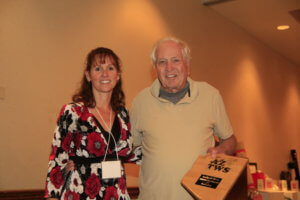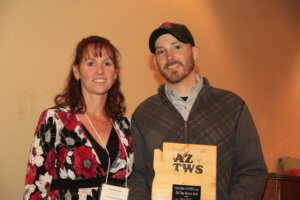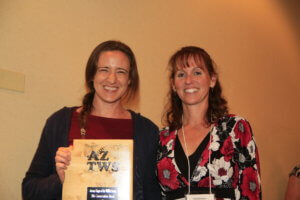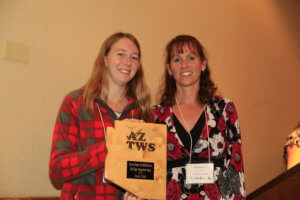This year we added two new annual awards, to recognize lifetime achievement and outstanding service to the chapter. The Arizona Chapter recognizes outstanding accomplishments in wildlife management, both by professionals and laymen, by bestowing awards at each year’s Joint Annual Meeting, held in February. This year marked the 50th Joint Annual Meeting of the Arizona and New Mexico Wildlife and Fisheries Societies and was hosted in Farmington, NM. We encourage our members to nominate deserving people or organizations for the awards, and as has been the case in the past, our chapter was privileged this year to receive numerous nominations for well-deserving individuals working in the wildlife management field. Below are summaries of each award, awardee, and the outstanding achievements for which they were nominated.
We congratulate each of our deserving 2016 awardees:
David Brown, Holly Hicks, Sarah Hale, Chad Rubke, Liberty Wildlife, Sandy Bahr, and Tice Supplee.
Read the official Press Release here.
David Brown
David E. Brown Lifetime Achievement Award
The David E. Brown Lifetime Achievement Award recognizes an individual for his or her accomplishments in wildlife biology and management over their lifetime.
David Brown is the first recipient of this award, named in his honor.
“Few, if any, people have contributed more to the understanding and science-based management of the wildlife of Arizona, New Mexico, and northern Mexico than Dave Brown,” says eleven of Brown’s colleagues in a joint letter of support for this award nomination. “Dave is a rare breed in this age of specialization, a naturalist in the truest sense of the word. We are inspired for all he’s done for wildlife science and conservation and are thrilled to be able to recognize his accomplishments through this legacy award.”
Brown started his wildlife career in 1960 at the age of 23. Wildlife politics were as contentious then as they are now, but Brown bridged political gaps through his exemplary performance as a Wildlife Manager and his keen insights into wildlife and their habitats. His broad interests and insatiable curiosity have lead him all over the world, including more than half the states in the U.S., 30 Mexican states, Central America, Cuba, Africa, Europe, and the Caribbean. These interests have resulted in more than 120 scientific and technical papers and more than 20 books on topics ranging from grizzly bears to Gila monsters. Brown and Charles Lowe’s classification of vegetation of the southwest US and northwestern Mexico has become a bible for defining biotic zones in the Sky Island region. Brown was a founder of the Arizona Antelope Foundation and has mentored hundreds of college students, often collaborating with them on research projects in an effort to give them a leg up on their careers. Brown is currently working on grassland projects with pronghorn antelope and antelope jackrabbits.
“This is a wonderful tribute,” says David Brown. “I owe much to my daughter and great-granddaughter, and to a college education at San Jose State where I majored in wildlife conservation and duck hunting under Dr. William Graf. My first career job was working for California Fish and Game banding ducks and mapping wetland vegetation for Bill Anderson during the summer of 1960. Much of my good fortune was having good Arizona Game and Fish Department supervisors who let me work on my own wildlife programs – Ted Knipe, John Russo, and Paul Webb. Although not an academic per se, I always felt comfortable in academia and had such giants as mentors as Drs. W. L. Minckley, Charles H. Lowe, D. I. Rasmussen, Miklos Udvardy and Jim Yoakum.”
Holly Hicks
Outstanding Service to the Chapter Award
The Outstanding Service to the Chapter Award is given to an individual who has volunteered significant time and effort to provide exceptional service to our chapter and its members.
Holly Hicks is the first recipient of this award. She has been a vital part of our chapter for a number of years, and often the first contact people have with our chapter. She keeps members and volunteers engaged through open, honest communication and an always positive demeanor. Holly has been the impetus behind our annual Wildlife Techniques Workshop, an active and willing part of the JAM Quiz Bowl, and an incredible resource to students and professionals throughout our state.
Besides being a great student liaison, she is a wonderful mentor and truly wants to see the students reach success. Students feel very encouraged interacting with Holly because she is so friendly and always has the student’s best interest at heart. Holly pursues any effort with great enthusiasm. Her professional focus on the less charismatic of species in Arizona is indicative of her generally broad interest and is reflected in how she deals with people. Holly treats everyone with great respect and a genuine concern to help facilitate opportunity whether for students or colleagues. Holly is a rare type of person. One who is willing and eager to assist in whatever way she can. The type of person that is selfless and hardworking, even if no one notices how much she is actually doing. Holly is the kind of person who is warm, friendly, and obliging but at the same time not afraid to tell it to you straight. She is willing to see the best in a person even if no one else does. She is the type of person who is strong and willing to stand up for what and who she believes in. She is the type of person that guides instead of leads. Says one of her award nominators, “In my experience, Holly always gives 150% to the AZTWS. She is always present, always efficient, always knowledgeable, always volunteering, and always kind. In many ways she was the consistent face I recognized in TWS leadership for the past decade.”
Chad Rubke
Doug Morrison Award
The Doug Morrison Award is given in memory of Doug Morrison to an Arizona Biologist in a non-supervisory position who has made significant contributions to the management and conservation of wildlife in Arizona. This Award exemplifies the dedicated work ethic of the Chapter’s former President and U.S. Forest Service Biologist, Doug Morrison. Contributions are in areas of wildlife research, education, and training, management, or law enforcement.
This year, the Doug Morrison Award was presented to Chad Rubke, for his exemplary work ethic and tireless efforts to help conserve Sonoran desert tortoises and other wildlife. Chad is a non-supervisory wildlife specialist whose impact reaches beyond his job duties with the Arizona Game and Fish Department. Chad specializes in Sonoran Desert Tortoise monitoring and research but has worked on multiple Department teams and always plays an important role. Chad has been an employee of the Department for five years and in that time has assisted in a burgeoning monitoring program for Sonoran Desert Tortoises. His contributions to monitoring of tortoises on the ground have assisted managers working with the Arizona Interagency Desert Tortoise Team to develop and implement recommendations in their candidate conservation agreement. Monitoring of tortoises at military bases, national parks, regional parks, and other public lands is essential to understanding population trends and detecting problems if they arise. Chad’s work ethic and drive are well recognized by his colleagues, and his dedication to his work is sincere and selfless. Arizona, the Sonoran Desert Tortoise, and the Arizona Game and Fish Department have benefited immensely from his efforts.
Vashti “Tice” Supplee
Professional Service Award
The Professional Service Award is given to an Arizona biologist for outstanding contributions to management and conservation of wildlife. This individual is also recognized for their professional work standards and conduct. Contributions are in the areas of wildlife research, education, and training, management, conservation, or law enforcement.
This year, the Professional Service Award was presented to Tice Supplee. Tice has blazed a trail for current and future women of wildlife. She was a pioneer for women in the Arizona Game and Fish Department and continued to prove herself, both as a habitat specialist and as a law enforcement officer. She excelled in a “man’s world” doing desert field work, law enforcement, and political scrapping at some of the highest levels in Southern Arizona. During these early years, Tice developed her very direct character and personality. One always knew where and how they stood with her. By the time she was promoted to Game Branch Chief, Tice remained approachable and willing to give her opinion, even though it was sometimes not what you wanted to hear. Tice followed a “legend,” Dave Brown, in a time of real divide between regional personnel and Phoenix office employees. It took time, but Tice bridged that divide, using her own honest and frank manner. As Branch Chief, she was recognized as smart, driven, and goal oriented. Not only did the Sportsmen’s groups respect her, she was and is an active member of many of them. She was the past president of the AZ Antelope Foundation. In 2004, she left the AZGFD to work for Audubon Arizona, the state office of the National Audubon Society. In her new role as Director of Bird Conservation, Tice coordinates Arizona’s Important Bird Area (IBA) program in partnership with Tucson Audubon. Tice was instrumental in growing Arizona’s IBA program and in creating four avian habitat conservation plans and a riparian habitat management guide. She works tirelessly leading field expeditions, mentoring beginning birders and synthesizing data collected not only through IBA efforts but through Christmas Bird Counts, eBird reports, and Breeding Bird Survey efforts. Tice is active in all of these citizen science efforts and encourages others to take part. In 2013, Tice’s role at Audubon expanded and she became a significant voice in the newly formed Western Rivers Action Network, an advocacy effort developed to protect water for wildlife in the West. The depth and breadth of Tice’s knowledge of water policy, coupled with her respected stature in political circles, makes her an invaluable player in this important effort. Meanwhile, Tice began teaching an Environmental Biology course at Phoenix College and sharing her wealth of knowledge with Community College students. Her supportive attitude helps them see what’s possible in their future while instilling new feelings of land stewardship and nature appreciation.
Liberty Wildlife
Conservation Award
The Conservation Award is given to a person, or persons, not employed directly as a wildlife biologist, or an organization not directly involved in wildlife management who contribute significantly to the conservation of wildlife and/or their habitat in Arizona. Conservation can include, but is not limited to research, education, legislation, and protection or enhancement of wildlife and their habitat.
This year’s Conservation Award was presented to Liberty Wildlife. Liberty Wildlife is a non-profit organization serving the community by rehabilitating native wildlife. Liberty has been serving Arizona for over 30 years after Dr. Kathy Orr, a veterinarian from Scottsdale, began to care for wildlife in her own home. With over 250 volunteers, they are also deeply committed to environmental education with over 800 events a year involving live animal demonstrations. Liberty also provides feathers to over 180 different Native American tribes. Over 6000 animals a year are rescued and transported to the medical division for rehabilitation. The new hospital and education center will soon be open to the public and will provide much needed educational and rehabilitation support for native wildlife from the metro area and the rest of Arizona.
Sandy Bahr
Scrapping Bear Award
The recipient of the Scrapping Bear Award has gone beyond the normal call of duty in support of wildlife issues and has made exceptional contributions toward the management and protection of wildlife and habitat resources AND the recipient has stood up for what they thought was right, even if it was controversial or perceived as contrary to their agency’s official position, supervisor’s positions, or had the potential to put the recipients job on the line.
This year’s Scrapping Bear Award was presented to Sandy Bahr, for her devotion to our wild lands and wildlife and her strong, persistent advocacy for the protection of these resources. Sandy is the Chapter Director of Sierra Club’s Grand Canyon Chapter. She has devoted her life to our wild lands and wildlife and is one of the strongest and most persistent advocates for the protection of these resources. She is a staunch supporter of science and consistently encourages the use of the best available science in all resource management decisions. Because of this, she often finds herself in highly controversial situations, yet she never falters in speaking out and working toward sensible solutions. Sandy is also a firm believer in the power of education and public involvement and works tirelessly to engage the public in natural resource planning. Sandy is a voice of reason for resources that cannot speak for themselves, and our state and its natural resources would be lost without her. As her nominators said, this award really could be called the Sandy Bahr Award and given to a scrapping bear.
Sandy was unable to attend the conference to receive her award in person, but says, “I am truly honored to receive recognition from an organization that I respect immensely. Arizona’s diverse ecosystems and wildlife are a big part of why I have made this state my home for 30 years. I love that we have deserts and grasslands and a variety of forests that sustain some amazing and resilient creatures. I love that we have native fish that have adapted to survive in little more than a mud puddle and species of snails that occur only in one set of springs. Of course, as tough as it has been, I am proud that Arizona is helping to provide a second chance for species such as California condors, black-footed ferrets, and Mexican gray wolves, and that we may one day see jaguars and ocelots return for more than just a visit. I remain hopeful about our wildlife due in large part to you all and others who are studying, conserving, and advocating for wildlife. Thank you for investing your time, your knowledge, your experience, and your passion in doing just that, and thank you very much for this award.”
Sarah Hale
Roger Hungerford Award
The Roger Hungerford Award is given to a student who, while attending an Arizona college or university, made significant contributions to the management and conservation of Arizona’s wildlife and/or habitat. Contributions are in the areas of wildlife research, education and training, management, conservation, or law enforcement. The Award is given in memory of one of Arizona’s finest research biologists, Roger Hungerford.
Sarah Hale was the recipient of this year’s Roger Hungerford Award. Sarah is a doctoral student at the University of Arizona who is committed to conservation and to making a difference in our natural world. Her research focuses on critical issues in conservation biology, such as the role of keystone species, restoration, and correlates of rarity. She is a skilled communicator and motivator who has worked closely with land management agencies for the conservation of wildlife. Sarah is also a dedicated and passionate educator and has engaged dozens of students in her research, has presented her research in a variety of settings, and has served as a Graduate Teaching Assistant in introductory biology. Sarah’s combination of professional drive, passion for learning, independence, intellect, and dedication to conservation issues make her an ideal recipient of this award. Sarah was unable to attend the conference and Amanda Veals (pictured here) accepted the award on Sarah’s behalf.





